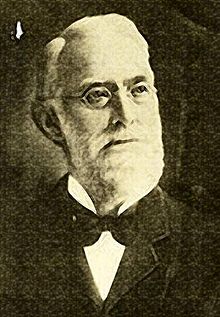Lester Allan Pelton
| Lester Allen Pelton | |
|---|---|
 |
|
| Born | September 5, 1829 Vermillion, Ohio |
| Died |
March 14, 1908 (aged 78) Oakland, California |
| Occupation | Inventor |
| Awards | Elliott Cresson Medal (1895) |
Lester Allen Pelton (September 5, 1829 – March 14, 1908) was an American inventor who contributed significantly to the development of hydroelectricity and hydropower in the old West and world-wide. In the late 1870s, he invented the Pelton water wheel, at that time the most efficient design of the impulse water turbine. Recognized as one of the fathers of hydroelectric power, he was awarded the Elliott Cresson Medal during his lifetime and recently was inducted into the National Inventors Hall of Fame.
Lester A. Pelton was born in a log-cabin in rural Vermilion Twp., Erie County, Ohio on September 5, 1829. His grandfather, Captain Josiah Pelton, who lost most of his assets as a sea-captain during the War-of-1812 era, shortly later brought his family to Ohio. Lester's father was Allen Pelton, and his mother was Fanny Cuddeback, from another local early pioneer family. As a youngster, Lester worked on his family's farm and probably attended the nearby "Cuddeback" grade-school.
In 1850, young Pelton, along with several other local males, emigrated from Ohio to participate in the California gold rush. He was not successful as a gold-miner, but he fished the Sacramento River and sold his catch locally; and he worked in wood-milling and carpentry. In 1860, after the gold strikes in the nearby Sierra Nevada he relocated to Camptonville—near the Yuba River and the California Mother Lode country—where he made his living as a millwright and carpenter. Pelton spent much of his time reading and observing mining activity; his work and studies gained him critical knowledge of mining equipment and processes and related engineering principles.
...
Wikipedia
